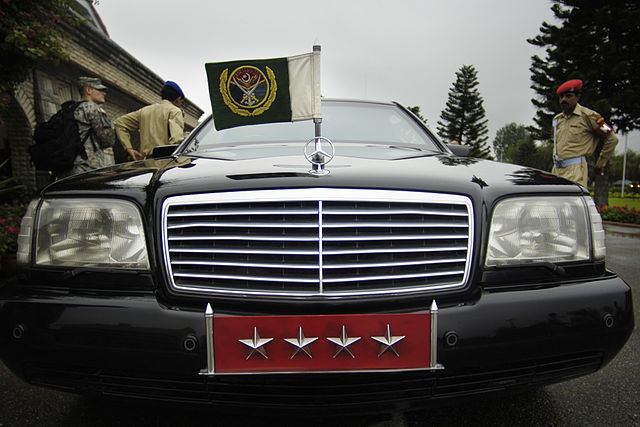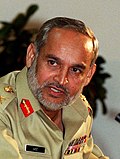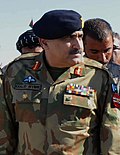Top Qs
Timeline
Chat
Perspective
Chairman Joint Chiefs of Staff Committee
Former highest principal staff officer of the Pakistan Armed Forces From Wikipedia, the free encyclopedia
Remove ads
The Chairman Joint Chiefs of Staff Committee (CJCSC)[a] was Pakistan's highest-ranking and senior most uniformed military officer, from 1976 to 2025, typically at four-star rank. The post was abolished under the 27th Constitutional Amendment in November 2025 and its functions were transferred to the newly created Chief of Defence Forces.[1][2] The chairman served as the senior uniformed adviser to the Prime Minister of Pakistan, the President of Pakistan, and the National Security Council of Pakistan. The office directed inter-service coordination, joint strategic planning, capability development, and oversight of tri-service institutions including the Strategic Plans Division. Operational command remained with the individual service chiefs.[3]: 42 The chairman led the meetings and coordinated the combined efforts of the Joint Chiefs of Staff Committee (JCSC), comprising the chairman, the chief of the Army Staff, the chief of the Air Staff, the chief of the Naval Staff, the commandant of the marines, the director general of the Coast Guards and the Strategic Plans Division, and the commanders of the service branches in the Civil Armed Forces and the National Guard.[4]: 145–146
Even as the principal staff officer (PSO), the chairman did not have any authority over the command of the combatant forces.[5]: 145 The individual service chiefs were solely responsible for the coordination and logistics of the armed and combatant forces. Due to this constraint, the chiefs of the army, navy and air force remained in effective command and control of their respective commands.[5]: 146–147
The chairman's mandate was to transmit strategic communications to the combatant commanders from the prime minister and president as well as allocate additional funding to the combatant commanders if necessary.[5]: 146–147 The chairman was nominated and appointed by the prime minister and was finally confirmed by the president.[5]: 147 Unlike the United States’ Chairman of the Joint Chiefs of Staff, the appointment of the chairman did not require confirmation via a majority vote by the parliament. Instead, the appointment required approval from the prime minister. By statute, the chairman was appointed as a four-star general, four-star air chief marshal, and/or four-star admiral. By law, all four-star officers were required to have extensive experience in the joint uniformed services of Pakistan during their 40-year-long military careers.[5]: 148
The post of CJCSC was created by the former prime minister of Pakistan Zulfikar Ali Bhutto in March 1976, and the first chairman was four star rank officer, General Muhammad Shariff. A total of 18 officer held the office between 1976 and 2025, with Sahir Shamshad Mirza serving as the final CJCSC.[6][7]
Remove ads
Appointment preferences
Summarize
Perspective
Despite the post of the chairmanship is bound constitutionally for the rotation, the army generals are strongly preferred for such post, despite coming short of their qualifications, by the civilian prime ministers in a view of stabilizing the civil military relations.[8]: 229 [9]: 426–427
Unlike the American system where the balance is made between the branches of the U.S. military, the majority of the chairmen are appointed from the department of the army, superseding the officers in the navy, marines, and the air force.[10]
In 1999, Prime Minister Sharif notably refused to appoint the senior most officer, Admiral Fasih Bokhari, to such post in favor of appointing junior-most officer, Gen. Pervez Musharraf. This action of Prime Minister Sharif led towards Adm. Bokhar revolting against this decision in public in 1999, creating strain in the relation between the civilian government and the military.[11][12]
The four-star admirals in the Pakistan Navy have been notably superseded by the junior army officers, in instances took place in 2005 when Adm. Karim was superseded by junior-most Lt-Gen. Ehsan ul Haq[13] and, in 2011 when Adm. Numan was bypassed in favor of Lt-Gen. Wynne.[14] In 2014, the practice continued by the civil government when Adm. Asif Sandila was bypassed and overlooked when the junior most officer, Lt-Gen. Rashad Mahmood was eventually appointed as Chairman joint chiefs.[15][16]
Due to such preferential treatments given to army department, the retired admirals have given a strong criticism of such criterion, expressing their dissatisfaction towards the appointment processes.[17]
Remove ads
The last Chairman Joint Chiefs of Staff Committee
27th Amendment to the Constitution of Pakistan, which determines the federal government's control and command of the armed forces. The amendment proposes changes to the command structure of the military leadership – including abolishing the post of Chairman Joint Chiefs of Staff Committee (CJCSC) from 27 November 2025, and giving broader responsibilities to the Army Chief, who will act as the Chief of Defence Forces.Sahir Shamshad Mirza last Chairman Joint Chiefs of Staff Committee (CJCSC) of Pakistan Armed Forces.
Remove ads
List of Chairman Joint Chiefs of Staff Committee
Remove ads
Chairman of the Joint Chiefs of Staff by Branch of Service

- Army - 14
- Navy - 2
- Air Force - 1
See also
Notes
References
External links
Wikiwand - on
Seamless Wikipedia browsing. On steroids.
Remove ads















